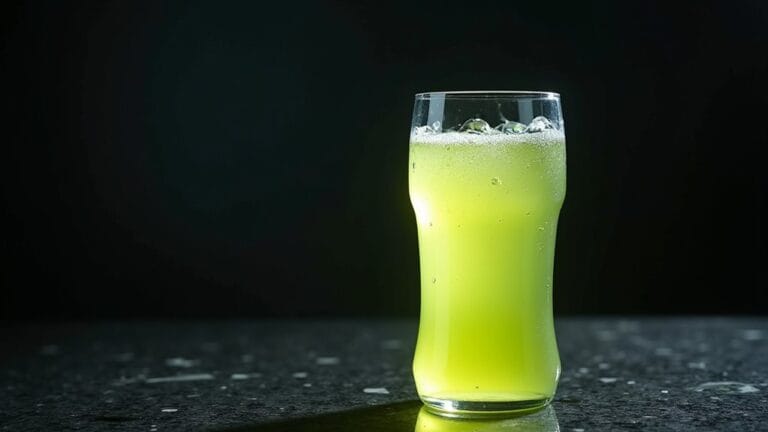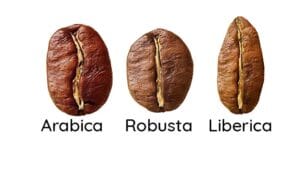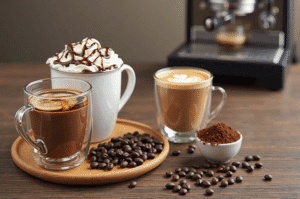Mountain Dew Caffeine Content by Size and Type
Every so often someone grabs a green can and wonders, “How wired am I about to get?” Regular Mountain Dew packs 54 to 55 mg of caffeine into one regular 12-ounce can, which clocks in at about 4.5 mg for each little ounce of soda. Coffee comparisons show that while a standard latte can reach 128 mg, Mountain Dew keeps its caffeine punch lower and more soda-like.
| Size | Flavor | Caffeine (mg) |
|---|---|---|
| 8 oz | Classic | 36 |
| 12 oz | Classic | 55 |
| 12 oz | Voltage | 55 |
| 16 oz | Classic | 73 |
| 16 oz | Energy | 180 |
The amount of caffeine in Mountain Dew scales pretty evenly when you up the cup size, and caffeine content in MTN Dew Energy triples the classic fizz, giving you how much caffeine in a can of Mountain Dew at a glance, super easy!
Mountain Dew vs Other Popular Beverages
A bright-green 12-ounce can of Mountain Dew splashes down with about 55 milligrams of caffeine, and that tiny number sounds cute—until you line it up against Coke (45 mg), Pepsi (37 mg), strong coffee (about 95 mg), and a can of Monster (150 mg), and suddenly the bubbly soda is either the calm kid in class or the sugar-fueled class clown depending on the drink sitting next to it. Afri-Cola delivers a much heftier 100 mg in the same size can, making Mountain Dew look almost mellow by comparison.
| Drink | Size | Caffeine |
|---|---|---|
| Mountain Dew | 12 oz | 55 mg |
| Coke | 12 oz | 45 mg |
| Pepsi | 12 oz | 37 mg |
| Diet Mountain Dew | 12 oz | 55 mg |
Daily Caffeine Limits and Health Considerations
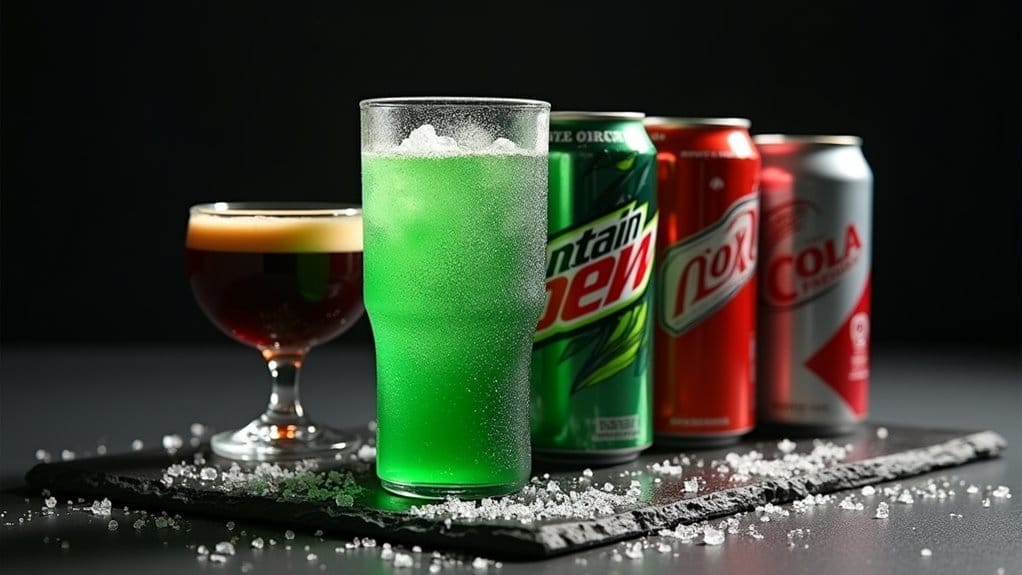
The U.S. Food and Drug Administration says most grown-ups can safely drink up to 400 mg of caffeine a day, about four or five Mountain Dews.
Too much, recognizable by jitteriness, fast heartbeats, or sleeplessness, means it’s time to put the can down.
Kids under twelve, teens, pregnant women, and anyone who feels wired after half a glass should stick to much lower limits or skip caffeinated soda altogether.
FDA Recommended Daily Limits
Starting with basic facts, the FDA has set clear daily caffeine caps that help parents, teens, and grown-ups stay safe and still enjoy their favorite drinks, like soda, coffee, or tea, without feeling wobbly, wired, or wide-eyed at 3 A.M.
Most adults get up to 400 mg daily; kids 12–18 stay under 100 mg. Athletic ten-year-olds squeak by under 85 mg; little ones dip with each year, dropping to zero for babes under four.
Wondering how much caffeine does mt dew have? A 12 oz can packs about 54 mg, so tally the details as you pour patriotic blue dew cubes over weekend popcorn.
For more serious health and safety considerations of caffeine consumption, health pros warn to dodge added enhancements in powders and energy drinks because FDA recommended daily caffeine limits for adults and children still apply everywhere, even Monday!
Health Risks and Warning Signs
How fast can a can of soda turn a sunny day into a shaky mess?
The amount of caffeine in Mountain Dew reaches 54-55 milligrams in every 12-ounce can, so watching how much caffeine in Mountain Dew builds during a two-can marathon matters!
Common warning signs of caffeine overuse include jitter legs, a race-car pulse, tummy rumbles, and eyes that refuse bedtime.
Folks with higher caffeine sensitivity might experience these troubles after just half a can.
Keep an eye on headaches, grouchy mood swings, and weird fluttering in the chest—clear flags the soda is winning!
Skip another pop, sip water, breathe deep, and let the shivers fade before they crash the party!
Who Should Limit Caffeine Intake
Most folks nod along when headlines scream “Watch the caffeine!”, yet sneaky sources like Mountain Dew still slip an extra 55 mg punch right past their radar—that means one can clocks in at roughly 14 percent of the daily okay limit for grown-ups.
Two cans stroll up to almost 30 percent, and before you know it stars are dancing on your eyeballs!
Pregnant women, kids, teens, and Individuals with Specific Health Conditions like heart trouble or anxiety should cap caffeine way lower.
Check caffeine in diet mt dew, how much caffeine does dr pepper have, how much caffeine in diet pepsi, speak to a doctor, skip late-night cans, and dodge powdered caffeine that can spike like fifty espressos.
Smart Mountain Dew Consumption Tips
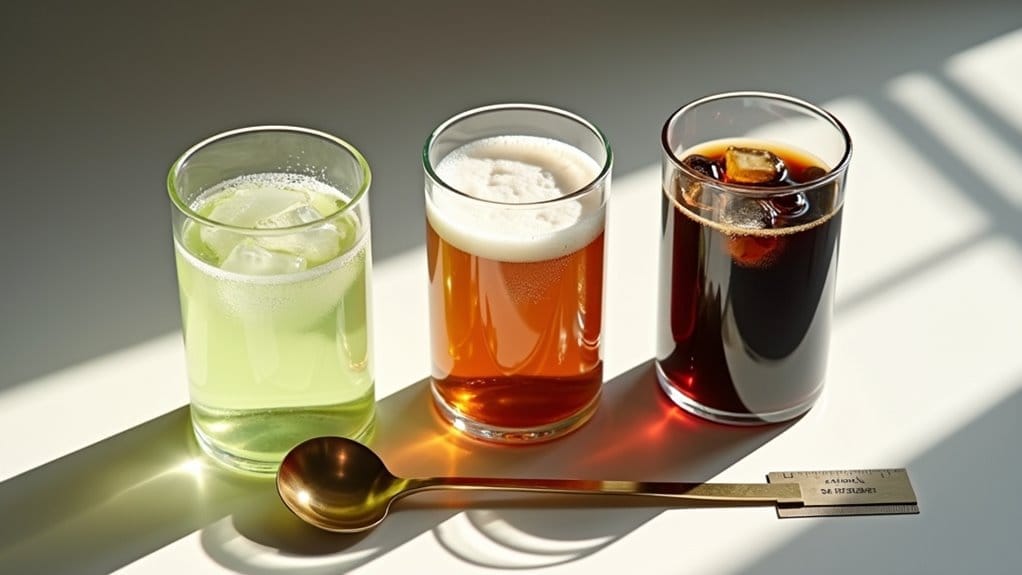
Because a can of Mountain Dew zaps you with 54 to 55 mg of quick caffeine plus a sugar rush strong enough to wake a hibernating bear, drinking it smart keeps both buzz and health on the same team.
- Know the numbers: check the exact mountain dew caffeine content, since how much caffeine in a can of mt dew varies slightly.
- Clock it early: sip before 2 p.m. so the 55 mg does not steal your sleep.
- Size down: swap mega bottles for a mini 12-oz; less amount of caffeine in mountain dew equals less crash later.
- Mix water: chase every can with a tall glass of water, shrinking sugar and mountain dew caffeine jolt while still tasting the zap.
When to Be Concerned About Your Intake
Where exactly does the fun fizz turn into, “Whoa, slow down!”? Easy answer: when someone keeps knocking back more cans than the body can take, that’s when trouble kicks in.
One 12 ounce can of Mountain Dew packs about 54 to 55 milligrams of caffeine, so three or four cans, taken with a latte or energy shot, march right past the safe 400 mg daily line, and boom—jitter city, racing heart, midnight staring contest with the ceiling pops up fast.
Populations most at risk from excess caffeine—kids, moms to be, hearts that already skip a beat—might feel off after even a single soda because their bodies yell “enough” earlier.
Stack that next to caffeine content in Dr Pepper at 41 mg, and the Dew can win the scary contest quicker.
Frequently Asked Questions
Does Mountain Dew Have More Caffeine Than Coffee?
Cool comparison clarifies: modest Mountain Dew surrenders serious caffeine supremacy to coffee, slacking roughly half the milligrams per serving.
Can Diabetics Drink Zero Sugar Versions?
Can diabetics drink zero sugar versions of Mountain Dew? Blood glucose monitoring permits occasional single 12 fl oz servings. Artificial sweeteners bypass sugar spikes; caffeine demands individual moderation under medical guidance.
How Fast Do the Effects of Caffeine Kick In?
Within. Within. Within. Caffeine’s stimulatory effects emerge within 10–15 minutes of intake, peaking at 30–60 minutes as adenosine receptors blockade increases alertness, mood elevation persists for hours, absorption accelerates under fasting states, variability follows individual factors.
Does Mountain Dew Contain Actual Juice?
Mountain Dew incorporates a minor proportion of orange juice from concentrate; it serves primarily as one flavor contributor within a high-fructose corn syrup, water, and additive matrix rather than a principal or nutritive ingredient.
Does Caffeine React With Antidepressants?
Caffeine can heighten stimulant side effects, inhibit some antidepressant cytochrome P450 metabolism, intensify anxiety, insomnia, tachycardia; clinicians advise monitoring. Interactions vary by class, MAOIs, TCAs carrying hypertensive seizure risks.
References
- https://www.caffeineinformer.com/caffeine-content/mountain-dew
- https://www.tastingtable.com/1316680/popular-energy-drinks-caffeine-content-amount-ranked/
- https://pmc.ncbi.nlm.nih.gov/articles/PMC5445139/
- https://www.efsa.europa.eu/sites/default/files/corporate_publications/files/efsaexplainscaffeine150527.pdf
- https://www.mayoclinic.org/healthy-lifestyle/nutrition-and-healthy-eating/in-depth/caffeine/art-20045678

